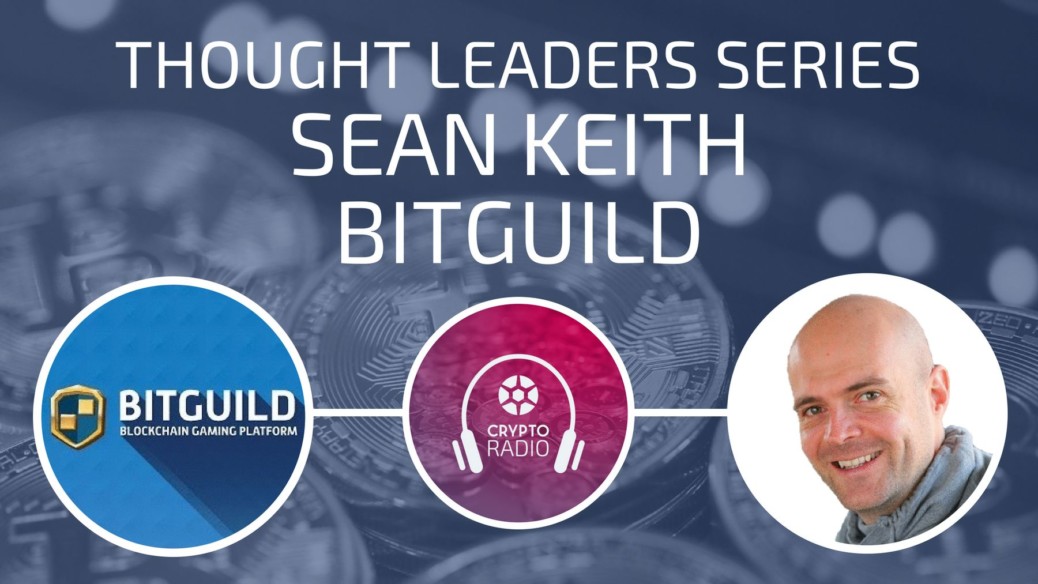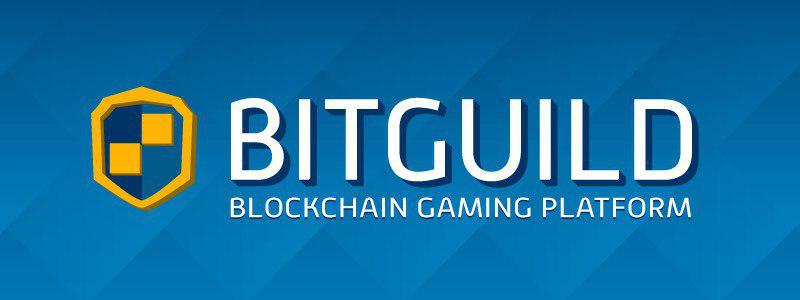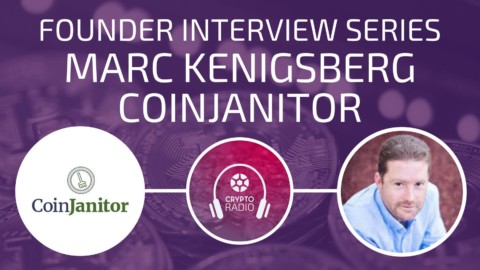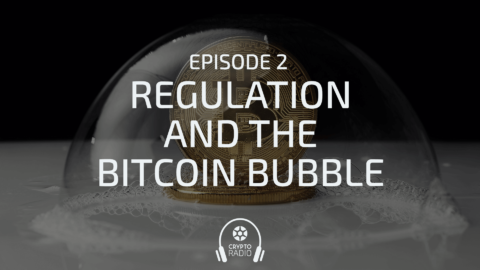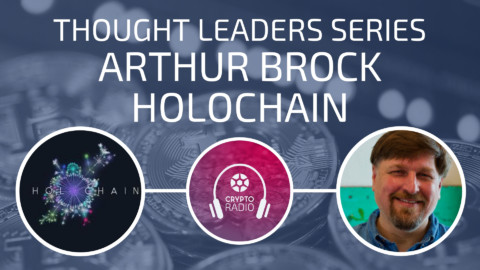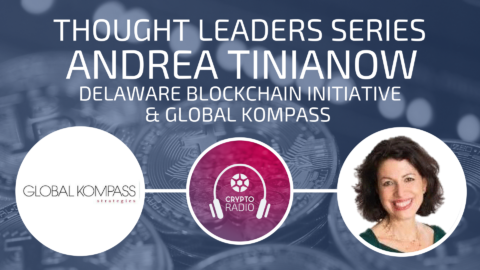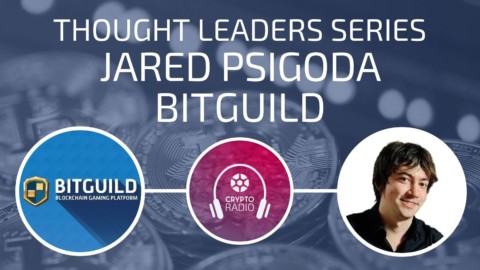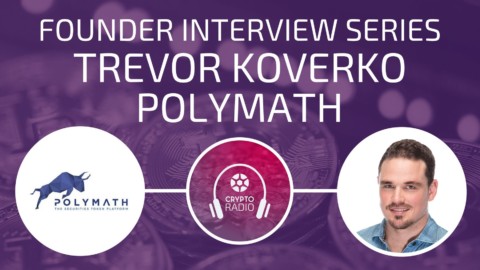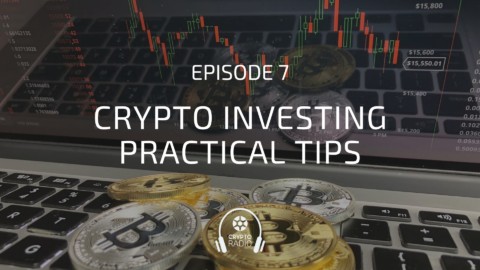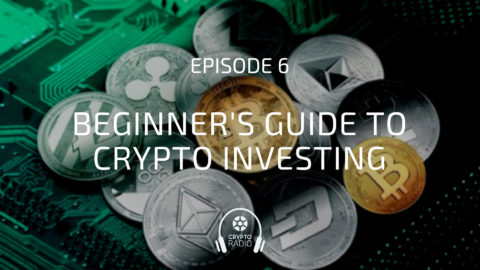Podcast: Play in new window | Download
Euvie: Hi crypto world, I’m Euvie Ivanova. Today on the though leaders series we have Sean Keith of Bitguild. We talk about the future of blockchain technology and gaming, both in terms of blockchain specific games and in terms of blockchain being used as a layer in mainstream games. Sean outlines some of the best use cases of blockchain technology in gaming and the challenges to getting there. For all the show notes from this episode go to cryptoradio.io/bitguild3. [00:00:30] This episode is brought to you by bitguild.io.
Bitguild is a new gaming platform built using blockchain technology. Their mission is to redefine the relationship between gamers and game developers. On the Bitguild platform, gamers maintain full ownership and control of their virtual items, which are stored on the blockchain. They can transfer items and progress between compatible games and they can make in game transactions safely and cheaply, and sometimes free. Developers who join the platform will get a direct link to an established [00:01:00] player base, a strong community, and a network of like-minded developers building on the same platform.
Developers will also have the potential for direct game development funding from Bitguild. The first version of the Bitguild portal is now live. You can login with Meta Mask, buy the Plat token, and play Bitguild’s first game, Ether Online. They now have a full inventory wallet system for in game items. In the coming weeks, the marketplace will be implemented and several independent developers are joining the site to bring their [00:01:30] unique games to the Bitguild family. Go to cryptoradio.io/play to start playing and join the Bitguild official Discord server to connect with the team.
Mike: Welcome to Crypto Radio. We interview the top thinkers and entrepreneurs in the blockchain and cryptocurrency industry. We also cover topics like trading, investing, and ICOs. We’re your hosts Mike Gilliland, Michael Paul, Chris Sparks, and Euvie Ivanova. We’re entrepreneurs, crypto investors, and co-founders of a new blockchain investment platform called cosyndicate.io. [00:02:00] We created Cosyndicate and Crypto Radio to make crypto investing a better experience for you. If you’re new to the show and you’d like a list of our top episodes and resources go to cryptoradio.io/start. If you like our podcast, you can subscribe, share, and follow us on social media, and leave us a rating and review on iTunes and elsewhere. It helps others find the show and we really appreciate it. You can find all those links at cryptoradio.io/start.
Sean: [00:02:30] My name’s Sean Keith and I do business development for Bitguild. I’m the vice president of business development here. I basically travel the world, which is both great and tiring, and meet with other thought leaders in the space. I’ve met with a lot of the large blockchain gaming companies, I met with Engine Coin, I’ve met with Wax, I’ve met with Crypto Space Commander, and Crypto Kitties. I’ve had an opportunity to discuss the common issues facing blockchain gaming companies, as well as potential solutions [00:03:00] and where the industry is going. For me, that is the most exciting part seeing in blockchain gaming is discussing with other thought leaders the most relevant issues facing the industry today.
Some of the things that I find most interesting actually is that a lot of blockchain gaming companies now don’t necessarily come from a gaming background. I’m not sure if this is well known outside of blockchain gaming space. I won’t say names but several of the largest blockchain gaming companies actually are more of a [00:03:30] technology company first. They had interesting ideas, they wanted to raise awareness of blockchain and then they got their products out there. I think that trend has continued to be true now.
At Bitguild I talk to a lot of independent game developers and try to convince them to put their games on our platform, basically, so we can slowly create lots of content which will be interesting to the players and the users coming to our platform. A lot of these studies, as well, actually, they [00:04:00] dabble in games but they write software for other companies, they also have a lot of other solutions that aren’t game focused. What you see now is you see a lot of companies taking innovative approaches about how to use blockchain within gaming that don’t necessarily come from the gaming world.
A lot of the games you’ve seen so far – I call them games lightly – aren’t necessarily game from a traditional game concept. For example, I think there was a bunch of farming games recently – Shrimp Farmer, [00:04:30] Snail Farmer. Being a traditional gamer, I don’t necessarily view those as games but they still got categorized as games on popular tracking sites such as [inaudible [0:04:39]. One of the trends that I think that we’re going to see going forward in the next three to six months is more game-like games emerge. That is to say, traditional gaming elements, whether battles, or cars, more traditional game mechanics. You’ll see those [00:05:00] in the experiences that are being offered to the blockchain gamers.
That is going to slowly begin to shift the demographic of players that are playing blockchain games away from crypto enthusiasts and more into a middle ground between crypto enthusiasts and traditional gamers. For me, I see the long-term health of blockchain gaming tied to being able to get more traditional gamers into the space. While it’s great to have large communities of crypto [00:05:30] enthusiasts that are playing these experiences, to really stay you need to tap into a much larger user base. I think that user base, the best place to tap into is traditional gamers.
Euvie: I’m interested in how long you think it’ll be before large scale games, like Grand Theft Auto, will have blockchain based items. Obviously, if games are being developed specifically to be hosted on blockchains, then it’s a different type [00:06:00] of game than these kinds of large scale games. Yeah, I’m wondering if you see that cross over happening any time soon or if people should even be thinking about it that way.
Sean: I would say there have been a number of mid-scale companies that have already reached out to us talking about how they have their own games and they’d like to strip parts of those games and implement blockchain technology to create a vibrant game economy with item [00:06:30] trading between players. That space, I believe, will mostly likely move forward in the next 6 to 12 months, maybe at the latest 2 years. There’s a lot of medium sized companies that are willing to take a small risk and integrate blockchain intimately with their games. For the large companies, I’ve heard of one that said something very similar to, “We’re going to go ahead and implement blockchain in our next project.” I don’t know what the production schedule is on that, I don’t know if it’s coming from scratch. I do know that they [00:07:00] said that they were going to make a game using blockchain technology.
I also know that there’s several large Asian game companies that have already spoken out in favour of blockchain and said that they were going to go forward and implement blockchain in their games. One is [inaudible [0:07:12], they’re a Japanese company, very large, do a lot of mobile games. They’re doing an ICO I believe now or in the near future. The other one is Smile Gate, they are the producers of the large game Crossfire which is huge in China. Their CEO is very interested in blockchain, as well.
I know that large companies actually are already saying [00:07:30] they’re going implement blockchain technology into their games. The way the blockchain technology’s going to implemented – is it just tokenizing assets, is there more, and the time schedule on those games is difficult to anticipate. At least with mid-sized game companies, one or two will probably produce products in the next 6 to 12 months.
Euvie: You mentioned that there are a bunch of developers that you’re trying to attract to your platform. What kind of developer are you looking for and is it like a specific category of developers, or is it just all game developers?
Sean: It’s all [00:08:00] game developers that are using blockchain technology in their games. I literally talk to teams of 1 to 2 people and I talk to teams of upwards of 30 and 40 people. There’s no one size of game developer that we’re talking to right now. The thing that we’re looking for specifically is game developers that want to expand their audiences, which is pretty much every game developer. We are attracting players to our platform, we’re creating an ecosystem where people come to play games. [00:08:30] For the game companies that really do want more players, I think there’s a lot of synergy between our offering and their content. We’re also looking for game developers that share in our vision and that is there’s some companies out there, I would say there’s some experiences, game experiences created for get rich quick schemes, and that is not part of our vision.
We’re not trying to create products that have pyramid like elements that the whole appeal of playing the game is to potentially make a lot of money really quick or maybe you’re going to lose the money. [00:09:00] We’re not focused on experiences like that. We’re focusing on game experiences. The entire company comes from the game background and, as such, we understand that the most important thing to attracting players to our platform is creating experiences that are fun. First of all, it doesn’t matter what technology, doesn’t matter what platform it is, games have to be fun first. We’re focused on finding developers that are trying to create fun experiences, engaging experiences.
The other thing that we’re trying to do is we’re trying to find [00:09:30] developers that are passionate about blockchain technology. The reason why is we’re still in the very early stages of blockchain technology being integrated with games. I think we’re going to see a lot of breakthroughs in the next 6, 12, 18 months underlying blockchain technologies, which will allow game experiences to be even better when integrated into blockchain. There’s no assurance right now that any of these blockchain games will make hundreds of millions of dollars like, potentially, you could in the [00:10:00] mobile space or in the console space or the PC space.
These developers, we hope that their passion really keeps them engaged in the space. They won’t be able to necessarily make a hundred million dollars, hopefully they do but if they don’t, that’s okay and they’re still willing to try to focus on making these big game experiences for blockchain gamers. Those three things; one, the developers have to have blockchain technology; two, they have to be looking to expand their player base; and three, we want to find people that are passionate [00:10:30] about blockchain technology itself.
Mike: What about blockchain technology is going to make the games more fun for the average user? What are they going to get out of it?
Sean: I would say there’s potentially four things that blockchain can really bring to gaming. First is player’s ownership of items. I might get in trouble for saying this but I wouldn’t necessarily say that player ownership of items is necessarily better or worse – it’s different. That difference allows for game developers to innovate on game design and game economy in ways that hasn’t been possible [00:11:00] before. Just recently I was talking to a large game company that experimented with allowing players to buy and sell their game items in the game and they said two things that really struck me.
To make a game where players can trade items, you have to be very savvy about the rarity of the items that are dropping, the scarcity, how you drop different items from different players, all of that has to be considered. Again, that takes a lot of innovation and foresight on the parts of the game developer. If done correctly, true scarcity [00:11:30] or provable scarcity in the game is extremely interesting to players, just like in the real world if you know that only 100 bags exist of this one really nice bag maybe you’re going to be willing to pay a premium price to have that bag and show it off to your friends. Same in a game experience. If you know there’s only 100 of these super special swords or wands, maybe you’ll feel really awesome if you actually get that item in the game but then you’ll be able to treat that item as an asset and say, “Okay, I really love this game but I’m going to sell it and buy this other armour that [00:12:00] I want instead.” You’re going to see a very interesting dynamic when the players actually own the item and are able to trade it with other players.
Mike: I love the idea of people getting organized and maybe doing raids and stuff for valuable items and they’re actually being a mechanism within the game that the ownership can be transferred if objects are stolen. That seems interesting because that adds a whole other game element where people… It adds that competitive element I think for these truly valuable items and then you can actually make money from it if you have it.
Sean: I can tell [00:12:30] you an interesting story, even though we’re still in the early days of blockchain gaming. Crypto Space Commander are good friends of mine. They recently had a small game event and they’re slowly opening up their game world in phases. They allowed players that had bought ships early on in the game – the game doesn’t exist yet but people have already bought ships – to actually go out and do this mining experience, where they could explore their entire universe and mine different elements using the ship they bought. You had people banding together just like in any other large RPG World [00:13:00] of Warcraft etcetera, forming guilds, forming coalitions, and going out and tracking the success of their mining efforts across the entire team.
It was that much more exciting because it is tied to player ownership of these spaceships, player ownership of the materials that they were mining and the ability to use those materials later on to craft things that could then be potentially, again, traded or sold to other players. I wouldn’t say that it’s different significantly in ways [00:13:30] from traditional games, but there is an interesting element once you add blockchain to it and you know that you can sell these items or these materials to other players and potentially even make money off of that in some kind of way.
Mike: Does this extend further than owned items? Are there other lesser known ways that blockchain could be utilized in fun ways for the user?
Sean: There’s a lot of really interesting ways that I’ve [inaudible [0:13:53]. I don’t want to give away certain company’s secrets, those game designers have told me their ideas in confidence. [00:14:00] There’s one kind of item or one concept that floats around out there and it’s been discussed by several game developers, so I don’t feel too bad about talking about it. That is the ownership, proof of authority within a game. Basically, just like in the real world where you can vote for your major or your governor or even your president, that can potentially be done within blockchain games. There’s a couple Sim City like game companies that I’ve talked to.
They said that once [00:14:30] the players buy land and they buy buildings, then technically they could later go on to even be able to vote for their district representative, then that district representative would make decisions in the game that would affect that entire city block or city that would make certain buildings produce things faster or make certain sales or things happen faster, or even create taxes where everyone that’s playing the game’s taxed in a small way then the major or whatever would go on to buy [00:15:00] a larger plot of land from the game developers that can then be used to build an airport, which then ultimately helps the growth of the city or something like that.
There’s proof of authority or governance is a very interesting concept that I’ve seen discussed, again, even outside of just Sim City like games. I think there’s a lot of creative ways that you’ll see blockchain implemented going forward but, yeah, sky’s the limit. I can’t talk about too many others. Some are really exciting but I can’t talk about them at the moment [00:15:30] because game developers are using it in new and innovative ways. Wait 12 months, 24 months and you’ll see a lot of cool things come out. You can almost liken it to the early days of mobile gaming and this is definitely not a one to one comparison but the early days of mobile phone being used [inaudible [0:15:46] a lot of traditional games come out and then you have things like Angry Birds, where they just utilize the mobile phone in such creative ways that they open the door for huge genres of games that didn’t exist before.
Blockchain technology has the [00:16:00] potential to do the same kind of thing. It’s a new technology, there’s going to be a lot of new innovation on it. Keep your eyes open the next 12 months to 2 years.
Mike: I think it’s quite interesting to think of gaming and blockchain from this perspective of maybe creating test environments for the real world where new decentralized democratic systems could be put in place and experimented with in a Sim City environment. I think there could be a lot of potential in having this real-world value that can be interacted with in the game, [00:16:30] up the stakes to it so that the testing can be maybe a little more realistic. That seems pretty interesting to me.
Sean: In a lot of ways I think the line between real life and our digital lives is starting to blur. The easiest way to see evidence of that is to go outside, you go on the bus, you go on the subway, and you look at the number of people looking at their cell phones. That’s still the digital world right there and it’s over 50 percent, if not 80 to 90 percent. People are engrossed in their phones for a large portion of the day. That is the digital world and [00:17:00] one of the things that blockchain technology does allow, just like you said, creating these imitation of life scenarios where, just like in real life, we vote for our president, we get taxed and we go and buy certain things.
Those things can happen within games and blockchain technology is a way to do that in a trustless system, which basically is saying when you go to fill up gas in your car the credit card company is being the arbiter of that transaction. That’s been a big [00:17:30] issue within games, it’s always been the game company themselves has acted as that trusted arbiter within games. Nowadays, you can actually build this kind of trustless system into the game itself and you can do it in a decentralized manner so the game company doesn’t have to be that neutral arbiter in the middle anymore. That’s going to allow for things just like you mentioned, voting, selecting representatives, maybe even setting taxes, all of that can be done within blockchain games in a way that maybe could have been done before [00:18:00] but might not have been as easy.
Euvie: What are some of the challenges that you’re seeing in the blockchain gaming space? Not just for the developers but in terms of adoption or scaling or anything like that.
Sean: Sure. The challenges are adoption, adoption, and adoption. I say that jokingly but really, the number of people that have access to cryptocurrency is vastly smaller than the pool of traditional gamers that exist out there. Within that [00:18:30] pool of people that have cryptocurrency, the number of people that are interested in playing trick crypto games or blockchain games is also very small. The biggest challenge facing the blockchain gaming industry right now is slowly growing that blockchain company. It’s something that it’s going to take a long time to do. There’s several key elements to it. First, there’s several key ways to actually increase this adoption and move the industry forward. One is creating simpler user experiences.
Someone [00:19:00] once at a convention put up a slide showing 10 steps between the player registering for an exchange to actually making a blockchain game purchase, there’s 10 steps in between. What we call a funnel in the industry, the point from top where the player first sets foot in the ecosystem to when they actually make a purchase is so cumbersome that the vast majority of players, even if they’re interested, once they realize there’s 10 steps in between making the purchase, they’ll never actually go on to finish [00:19:30] even step one or two. Making that process as simple as possible, cutting out all the steps possible and integrating with technology – for example, we use Meta Mask on our site. We require players to use Meta Mask on our site. We’re trying to figure out ways to make that even less cumbersome and more fluid, more organic, so that players won’t feel friction when they do want to participate with the game.
First of all, user experience and simplicity. The second part is [00:20:00] actually buying cryptocurrency. We have a token on our platform, a utility token, that we call Plat. Players must use must use Plat in our games. We’re trying to make it easier for players to acquire Plat in ways that don’t run against any regulations out there. Just creating solutions for players to acquire Plat, the utility token, then use in our platform is really important to us, as well. Outside of that, just getting people excited for blockchain games in general. [00:20:30] A lot of people out there joke, “Yes, blockchain is the solution to problems that no one has.”
Blockchain does solve some issues that do face traditionally gaming but I think, even more importantly, it creates opportunities that haven’t existed within gaming before. That is really what is exciting in player ownership of items and even, potentially, we can talk about this later today, interoperability of items between different gaming experiences, being able to take your favourite items and characters and [00:21:00] take them from one gaming world to another. Getting people excited for these kind of things, getting people to believe that, “Hey, Ready Player One isn’t just a movie, it’s actually something that could be achievable within the blockchain gaming space within five years.” That’s another very important item that we have to work towards.
Euvie: Yeah, the interoperability and the interusability of items between different games, that’s super interesting. I wonder if that were to really catch on, if the game developers know that this is an option, [00:21:30] and if users request it of course, then that pressure can make that happen faster. How do you see the adoption of that happening? To me, in that mind, that’s a secondary thing. People have to find out about blockchain gaming first before they would even find out about that. Do you see a path where people would find out about this interoperability thing through traditional games rather than through the blockchain space?
Sean: It’s interesting. Interoperability has already been achieved in several traditional games. These games, I think, [00:22:00] are a group of concepts for a larger usage within blockchain. That is Minecraft and Roadblocks. Minecraft and Roadblocks both allow users to create different kinds of gaming experiences. There’s a ton of them in both ecosystems and then players are able to take their characters or whatnot between those different experiences if the experienced creators allow them to. The fact that Roadblocks and Minecraft have been so wildly successful, especially with the younger generation, I think that [00:22:30] bodes very well to the future generations of gamers being interested in interoperability of items between games going forward.
Blockchain technology can allow that to happen. To be honest, interoperability of items and characters, we’re a ways away for that to truly happen. The reasons why are one, technologically, let’s say you have a token of a sword and that token exists in one game that you really like. You log into that game, the game looks in your wallet, it sees the token, “[00:23:00] Okay, your character has that sword.” Game developer B, if they want to also display there’s that same sword in their game, they have to look at how that sword was graphically rendered in game A and they have to imitate it in their game. That means their game ecosystem has to allow for that rendering, which has a lot of technologically challenges.
There’s also the issue of licensing. Just because the token exists in the player’s wallet doesn’t mean the game developer B has licensed to graphically [00:23:30] represent that sword in their game. These are a lot of the tricky challenges that are facing interoperability right now, technology side, licensing side, and then actually having the yearning – game developer B has to want to integrate that sword into the game, as well. Integrating that sword means they’ll be able to sell one less sword themselves, or maybe their own swords will be the value [inaudible [0:23:54] because they’re allowing swords from other games to come into their game.
These are issues [00:24:00] that we’re facing right now. Us, Bitguild as a platform, but also other game developers. There’s ways to potentially solve these issues and, to be honest, I’m quite active in talking to a lot of game developers about, “Let’s solve these issues, let’s create standards, let’s create these open standards that will allow other gaming experience creators to directly reference your game assets in their games without having to do cumbersome licensing agreements or having to figure out how to graphically render [00:24:30] your sword in their game.
It’s going to take buy in from the developer community first, then once there are some examples of that happening out there I think that those examples will be broadcast far and wide, so people won’t necessarily have to know about blockchain gaming will be able to show them, “Hey, this is happening right now. You can take your sword from game A to game B, it’s happening in blockchain games. You don’t know what blockchain games are? Come and find out.” That will actually be a driver of interest in the industry from traditional gamers that [00:25:00] didn’t necessarily think about playing blockchain games in the past.
Euvie: Yeah, it seems like blockchain might end up being just a layer inside of other technologies, rather than being advertised as its own thing and people just use it but they won’t even know that it’s being used. The second thing that I was going to say is that it seems that somebody needs to create gaming interoperability aligns, where these kinds of issues can be talked about and solved in a group fashion, [00:25:30] because then you can create standards for everything, then you can create standard agreements, licensing agreements and all of that stuff. People who want to be mart of it, game development companies or blockchain companies that want to create the payment layer or something, they can all come together and plugin to the existing ecosystem.
Mike: It does really seem like there needs to be a very standardized platform for small companies, like EA games, to be able to implement all at once.
Sean: Yeah, good news. There already are these larger alliances and people are discussing interoperability [00:26:00] standards. We’re quite active in those discussions. Two, just like you said, those standards are extremely important to smaller game companies. EA’s probably not going to jump in for a while. The smaller game companies that do believe in the vision of blockchain gaming, they will want to make sure their game assets are accessible by other companies. Especially because every time a game asset is traded between players, the way that smart contracts work now, a small portion of that transaction between players actually goes back to the developer.
[00:26:30] They are very incentivized to have their items, their game assets, live an eternity, because every time that asset is traded they’ll get a small cut of that transactional volume. Something you said, too, is super smart. Right now, we say blockchain games as if they are a separate thing. They are games built using blockchain technology. Blockchain technology is just the layer within the game. I think, given the nature of blockchain technology, players will know if blockchain technology is being used simply because trading with other players will be [00:27:00] very streamlined and it’ll be done in a way that works with the blockchain the technology’s built on. Right now, all the games are built pretty much using Ethereum.
Going forward, we’re going to see other chain technologies also being used in games a lot more. There are several other games that don’t use Ethereum right now but they’re not as many as Ethereum games. In the future, we’re going to see games called, “Games that use blockchain technology,” just like, “Games that use unity, games that use unreal.” Maybe it’ll be, “Games that use the Ethereum [00:27:30] blockchain, games that use the Eos blockchain.” We’ll see. I think that’s going to become more of a trend going forward, as well.
Euvie: What are some of the other DLTs or blockchains or other types of decentralized technology that you see being really valuable for the gaming space in the future, other than Ethereum?
Sean: Yeah. Let’s talk about the characteristic of the blockchain. There’s so many different blockchains out there. I can just think of 10 to 15 that I’ve talked to in the last 2 or 3 months. Going into the specifics of each of those blockchains would take a while. [00:28:00] I would do them a disservice by talking about them. The characteristics of blockchains that gaming companies are looking for are one low cost in transactions if not free. A big issue right now, just to give you a story, we are working with a game and the game wanted to give out free items to players. Players were really excited. Everyone loves free things. The issue was, for players to actually put those items in their wallets, they had to codify or confirm the transaction on the Ethereum [00:28:30] blockchain and the cost in gas in that day was $1.50.
Here’s the game developers trying to do something good, trying to give gameplayers free items and the players being pissed off like, “I don’t want to pay $1.50 for this free item, what are you doing?” It’s just, right now, players in a lot of gaming experiences have to pay to confirm their transactions on blockchain. If a blockchain can take care of that and make it so the transactions are free, that is huge because then that gets rid of a lot of friction between players and the blockchain. [00:29:00] I know there’s blockchains that are trying to do that right now. There’s also sidechain solutions. Games are being created right now to take advantage of those free transactions.
We’ll see what happens in the next six months to one year. The other thing is having transactions be confirmed on the blockchain quickly. Right now, for example, if you’re playing Crypto Kitties, just one example out of many, if you want to buy a cat, first of all, you have to boost up your gas that you’re willing to pay for the transaction to be confirmed. Then you usually have to [00:29:30] wait, the quickest maybe 40 seconds to a minute if you’re not wanting to pay a lot to get your transaction confirmed.
Maybe you’ll end up waiting for 10 minutes, 20 minutes, even an hour. For a traditional game, there’s no way that that would fly in the game, except outside of some auction house functionalities. Really, future blockchains needs to solve for the cost, zero transaction cost, they need to make transactions quick and the last thing they need to do is they need to have really good tools for developers to build on top of. [00:30:00] That’s one of the reasons Ethereum has done so well in attracting a lot of game companies is they have a suite of tools and a lot of solutions for game developers to build on top of that makes integrating blockchain into their games easy.
You need to have these tools for developers and you also need to have a lot of solutions like easy to use wallets etcetera for players. Players then are able to use that blockchain really easily, whether it’s non-fungible tokens, being able to display the non-fungible tokens in certain wallets or actually fungible tokens having [00:30:30] an easy interface of buying and selling that blockchain’s cryptocurrency. Those things all need to be done easily so players can operate in that ecosystem easily. Just so you know, that’s not always done by the blockchains themselves. Sometimes the blockchains need to create a thriving developer community on top of their blockchain so these developers will then go create solutions for them, instead of them doing it themselves.
Euvie: Yeah, this is why interoperability in general I think is hugely important because, if you have blockchain developers building wallets or [00:31:00] interfaces or whatever for one blockchain, then they have to switch over and do the same for another one, it’s just such a waste of effort. If they could just use the same interface layer and be able to use an API that plugs it in with multiple blockchains, it just makes so much sense and with multiple games, as well.
Sean: You understand the situation very well. Yeah, that’s a big challenge right now. A lot of people are building games based on solidity or using solidity for Ethereum. What happens if a better solution comes on down the line? [00:31:30] Do they have to strip that out and they have to build a new kind of interface layer from scratch based on the new blockchain’s coding solution? It’s just there’s all these questions. The tough part is information right now, it’s relatively siloed. People are focusing on their projects, they’re trying to get their projects built using solutions that work right now, they want to know about future solutions but getting easy access to that information, trusting that information, being able to action on that information.
For example, creating an interface layer where you could connect [00:32:00] to not just Ethereum but other blockchains. We’re still in the infancy of that kind of interoperability and that, hopefully, will become easier to do moving forward. I know there’s a lot of companies trying to create multi-blockchain solutions or into blockchain solutions. Those solutions, to be honest, from what I’ve seen right now, are still very new and, as such, they have their own issues. I believe, again, blockchain technology is still in its super infancy with gaming and I think in the next 6 months, 12 months, [00:32:30] 2 years, we’ll see a lot of solutions that really move the industry forward in really meaningful ways.
Euvie: Yeah, I’m really looking forward, too. I really hope that interoperability alliances start springing up and I know there are a few, but I hope they become bigger and I hope more blockchain gaming and just regular blockchain companies buy into it, because I think it’s really needed and seeing this kind of broken apart siloed environment is sad, in a way, because the spirit of blockchain is all about decentralization and against silos. [00:33:00] But what ends up happening in practice is that everybody wants to do their own thing in each corner of the world. Yeah, I hope that people can come together and start thinking about things from a bird’s eye view perspective, rather than just their own little part of the field.
Sean: There’s a lot of challenges to that and I would like to point out that talking about breaking down silos, it sounds very great but it isn’t necessarily as large of a problem as we’re talking about now. In the Ethereum blockchain, there are a ton of adopters already that are [00:33:30] holding Ethereum. For them to go and spend that Ethereum in blockchain games is not a huge problem. If someone has Bitcoin, the ability for them to change that into Ethereum right now and then use that Ethereum in the games is relatively easy. It would be great if that wouldn’t be a problem but, at the moment, it still is. What is going to be a big problem is when there’s a better blockchain solution out there and someone has their game in Ethereum.
How to create interoperability between those things right there. I don’t know enough about it. It’ll probably [00:34:00] involve just getting rid of functionality with the older, slower, worse blockchain solution. The blockchain solution is not optimized for their game and going to the solution that is, we’ll see. There’s a lot of smart people looking at this issue right now. Game developers are especially smart, they are going to try to make the games using the best solutions possible to create the best game experience possible for their players.
Mike: Last question before we round off this episode, I just want to know what you think is the most exciting about the future and what kind of vision you guys have for the future if everything goes well.
Sean: Sure. [00:34:30] The most exciting thing – I’m a sci-fi nerd, I read books like Snow Crash, Ready Player One long before it was a movie. The concept – I’m a big gamer, as well – the concept of really being able to take my orc barbarian and fight against hoards of dwarfs and then go and race him in a monster truck in a racing game, and maybe taking him on a dating sim is just, it’s very fantastical but if that was actually [00:35:00] achievable, that to me would be so amazing. It’s like we’re bringing in the realm of sci-fi, these things we thought about in sci-fi and actually making them a reality.
For me, to be part of something that moves humanity forward in a way is extremely empowering, both professionally – I love doing what I do – but it’s also exciting from a gaming perspective and from a perspective outside of gaming. Suddenly, you could be taking an orc barbarian and he could be your avatar when you’re baking, like you do a virtual banking thing and that [00:35:30] the banker sees your orc barbarian there in the queue. It’s just ways to digitally express yourself, ways to use your digital assets in ways that haven’t been done before. That, for me, is just super exciting. We’re a long ways off but part of the reason I’m here at Bitguild is because I do believe in that vision and I want to work towards it. That’s what’s most exciting for me, in my nerd brain.
Mike: I think Ready Player One was such a fantastic movie and gave me so many ideas [00:36:00] about how these things could actually be implemented in real life. If you had have talked of any of these concepts in the past, it would have been like, “Yeah, sure. Sounds nice but how would that be implemented?” They gave a really nice visualization of it?
Sean: Before that movie came out, it was really hard to conceptualize for people that aren’t necessarily hardcore gamers to conceptualize moving their character between different games. Once that move came out, it was very easy to reference it and say, “Think of Ready Player One, think of these scenes. Okay, you’ve got it.” That is [00:36:30] really one of the things that we want to achieve.
Mike: Very cool. How can people get a hold of you?
Sean: You can send me an email at sean@bitguild.com. I travel a lot, so if I don’t respond for a couple days, my apologies. If you’re a game developer and you’re interested in our platform, please reach out. Again, sean@bitguild.com. If you’re a player, come visit our website bitguild.com. We hope to have a lot of really great games soon, we have a couple right now. You’ll be able to see the best games out there right now that are using blockchain technology and you’ll hopefully be able to learn about [00:37:00] the new games that are coming out using blockchain technology, as well.
Mike: Great. Thanks for joining us. This has been fun.
Sean Keith talks about the opportunities and challenges of using blockchain technology in future gaming.
Sean Keith is the head of business development at Bitguild. In this interview, he discusses the future of blockchain technology in gaming, both in terms of blockchain-specific games, and in terms of blockchain being used as a layer in mainstream games. He outlines some of the best use cases for blockchain technology in gaming, and the challenges to getting there.
What we cover in this episode:
- Long term health of blockchain gaming
- Cross-over between blockchain games and large-scale games
- The possibility of gaming being used as a test environment for the real world
- Creating simple user experiences as a necessary condition for blockchain adoption in the gaming space
- The opportunities that blockchain creates that haven’t existed in gaming before
- Importance of interoperability of gaming items and characters
- What gets traditional gamers to start thinking about blockchain gaming
- Blockchain technology used as a layer within games
- The opportunity to be a part of a development that moves humanity forward
Mentions and Resources:
- Sean Keith
- BitGuild website
- Crypto Radio’s Thought Leaders Series

